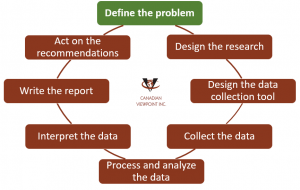Depending on how you break down the steps of the research process, there is a multitude of extremely important steps. And each one seems just as important as the last. Let’s review each of the steps to identify which one is most important.
- Design the research plan. Designing a solid, rigorous research plan is absolutely essential. By taking the time to plan ahead, you ensure that vital target groups are not missed, that important questions are not missed, that potential biases and skews are anticipated and planned around, that sample sizes will be appropriate to measure every necessary subgroup, and that deadlines and budgets are respected. The adage “measure twice, cut once” applies to consumer research perfectly.
- Design the data collection tool. Designing a solid, rigorous data collection tool is also absolutely essential. A well written questionnaire or discussion guide ensures participants are stay on track and are comfortable with the topic at hand. It ensures the end results are not misleading. It ensures that the most important questions are carefully and fully addressed, and that nothing is missed.
- Collect the data. As with any of the other stages, many non-sampling errors can enter the research process during the data collection phase. Researchers must be careful to apply the data collection tools consistently for every person whether that means treating each person in an individual interview the same or ensuring that questionnaires work properly on every single device. Sampling strategies must be strictly adhered to and appropriate accommodations must be made when the strategies fail to come through. One could easily argue that this is the most important stage.
 Process and analyze the data. Of course, conducting careful and accurate data analysis is also extremely important. The researcher must take great care to properly clean the data prior to analyzing it. Poor quality data must be removed and replaced without creating a new set of biases. Statistical tools that are appropriate to the task must be selected. Only with care will the analyses truly reflect the opinions that were initially gathered.
Process and analyze the data. Of course, conducting careful and accurate data analysis is also extremely important. The researcher must take great care to properly clean the data prior to analyzing it. Poor quality data must be removed and replaced without creating a new set of biases. Statistical tools that are appropriate to the task must be selected. Only with care will the analyses truly reflect the opinions that were initially gathered.- Interpret the data. Interpreting the data is not always simple. Sometimes, interpretations depend on life experiences and training. Researchers who have learned certain theories of branding or purchase decisions or new product development could come to different conclusions as someone who has learned other theories. Someone who’s never experienced great wealth or severe debt might come to completely different decisions. Extreme care is important at this stage as well.
- Write the report. Report writing doesn’t always get the respect it deserves but this is often the only touchpoint people have with the research. Reports must be clear and organized. They need to carefully highlight which points are most and least important. They must clearly identify which points are facts and which are conjecture. Reports need to guide and direct, but also let the reader know when they ought to be cautious or bold. Any missteps here could also lead someone down the wrong path.
- Act. Strangely, this last step of the research process is rarely considered. What is the point of conducting research if most of the recommendations aren’t acted on? What is the point of conducting research where most of the questions are ‘good to know’ or ‘interesting to see’ and nothing is done as a result? It seems like a waste of money to do so much work and then place the report on a virtual shelf without acting on as many of the recommendations as possible. This is why the most important component of a research project is acting on the conclusions and recommendations that result. If you don’t do this, the entire project will be a waste of money.
Consequently, as you proceed through the research process, always think ahead to the end.
- How would you implement every possible outcome and recommendation that might result from the research?
- Who would need to implement any recommendations and would they be able to do so?
- If you know you can’t implement a recommendation, can you revise the research plan so that the outcome would be actionable?
Let’s aim for research that is designed to be actionable from day 1. The report might look nice on a virtual shelf but actioning the results would look fabulous.
You might like to read these:




